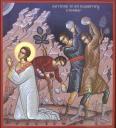Ten years ago, on the Feast of Corpus Christi, I was confirmed into the Episcopal Church. This feast will always have a special significance for me. It was because of the Eucharist that I entered the Episcopal Church and it is for the same reason that I became Catholic.
It’s been almost year since I moved to Chicago, in order to attend St. John Cantius, be formed by the Canons Regular and finally be confirmed by the Bishop. For most Anglo-Catholics the conversion process is a difficult one (especially in regards to the Novus Ordo, whether abusively celebrated or not, it is seen as greatly inferior to what is celebrated in most Anglo-Catholic parishes). There can be no question that the Anglo-Catholic tradition is a beautiful one, both in its music, hymns, and English translations of the Bible (eg. KJV and Coverdale’s Psalms) and the Mass. Once I converted and stopped going to the Episcopal parish and started visiting the Catholic parishes in the area where I was living at the time (central PA), I knew for the good of my soul I had to find a traditional parish that celebrated the Traditional Mass and had a rigorous devotional schedule…. Thanks to the internet, NLM and Daniel’s “The Lion and the Cardinal,” I found out about St. John Cantius. I wanted to attend the most Catholic parish in the US and St. John Cantius (if I may say so) is probably it. (It is at least in the top 10). So I moved.
For me the transition from Anglo-Catholic to Roman Catholic has been very easy, to be honest. This is partly because I was such a bad Anglican and because I am able to attend such a good Catholic parish. I do not miss that much about the Anglican/Episcopal church. Yet, I must confess that I still read my Anglican Breviary. And although this book has not been approved for use in the Church there is actually not much Anglican about it (when the Prayer Book Collects vary from the Roman Rite it gives both). I do, however, miss the 1940 hymnal. I was raised to sing in church and sometimes I find the recessional hymns (even at St. John’s) fairly lame. (That just means I have to learn how to read square notes).
I didn’t really care about Merrie Olde England (one of the reasons I was such a bad Anglican). I was (am) a Francophile not an Anglophile (thus my appreciation for Traditional Catholicism). The reason I supported the Anglican Communion was because I thought it was catholic (universal), transcending national and cultural boarders not because it was English. I was eventually relieved of that illusion, for there is no Communion in the Anglican Communion (in any sense of the term). The so called “genius of the Anglican tradition,” the Via Media, is the wide road that leads straight to Hell. If I shared anything in common with the Catholic Church as an Anglo-Catholic it was despite of the Anglican Communion, not because of it.
This is not to say that I have any illusions about the lack of communion (or other very serious issues) in the Catholic Church. God knows there is a battle to fight, but this is the only Church that can do it. The “gates of hell will not prevail against it.” This means we are the ones storming the gates of hell. By the grace of God, we will continue to lay siege to Hell until the last of the elect are fighting with us. Are you with us?!






















